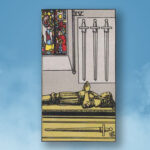This post may include affiliate links to products we think you'll find useful. We may earn a small commission if you buy through these links. Read our affiliate disclosure.
The Five of Swords tarot card is a symbol laden with themes of conflict, deception, and ethical dilemmas. Often signaling a challenging phase in your life, this card urges you to confront and scrutinize the nature and cost of winning, whether in relationships, career, or your personal life. It serves as both a cautionary tale and an invitation for self-examination, asking you to carefully weigh your actions and their consequences.
Five of Swords keywords & concepts
Upright keywords
- Conflict
- Deception
- Winning at all costs
- Betrayal
Reversed keywords
- Making amends
- Reconsideration
- Regret
- Defeat
Five of Swords tarot card description & symbolism
The Five of Swords tarot card is a complex symbol often associated with conflict, deception, and the pursuit of victory at any cost. It portrays a tense emotional or situational landscape where battle lines are drawn and stakes are high. At its core, this card serves as a cautionary tale about the nature of winning and losing, questioning the ethical boundaries one might cross to achieve a perceived victory. While it may indicate an impending or ongoing struggle, whether internal or interpersonal, it also calls for introspection. The card urges you to evaluate the consequences of your actions, especially in terms of relationships and personal values, asking you to consider whether the ends really justify the means.
Five of Swords upright meanings
1. Conflict
The upright Five of Swords in a tarot reading often symbolizes conflict, either within yourself or with others. This is not merely a disagreement but a struggle where stakes feel high and resolution distant. The energy surrounding this card is one of tension, as if you are in a battlefield of sorts, whether emotional, intellectual, or even physical. The card prompts a reflection on the nature of the conflict you’re engaged in: Is it inevitable or self-created? Are you actively participating in it, or are you a bystander swept along by circumstance? The Five of Swords asks you to confront these conflicts head-on but also to evaluate whether they are worth the emotional or material cost.
2. Deception
Deception is another theme linked to the upright Five of Swords. This card can indicate that there might be deceit or underhanded tactics at play, either by you or someone else involved in the situation. Trust becomes a casualty in the atmosphere that this card portrays. The deceptive elements may not always be obvious; they could be subtle manipulations or hidden agendas that skew the balance of power. The card serves as a warning to be alert, to scrutinize motives—both yours and others’—and to tread carefully when the truth seems obscured. It urges you to maintain integrity even when faced with dishonesty.
3. Winning at All Costs
The Five of Swords suggests an attitude of “winning at all costs,” where the drive to come out on top overshadows ethics, friendships, and even one’s own well-being. This zealous focus on victory can often lead to pyrrhic wins—situations where the cost of winning outweighs the actual rewards. The pursuit of triumph becomes so single-minded that it blinds you to the potential long-term consequences, damaging relationships or personal values in the process. It’s a cautionary representation, asking you to consider what you’re willing to sacrifice for the sake of victory and whether the price is truly worth it.
4. Betrayal
Betrayal is a painful reality suggested by the Five of Swords. This card can signify a situation where trust has not only been broken but shattered, often through manipulative tactics, lies, or deceit. The emotional landscape here is bleak, marked by disappointment, sorrow, and sometimes a sense of inevitable doom. The card could be highlighting your own betrayal of someone else or pointing to your being betrayed. Either way, it serves as a prompt to reflect deeply on the actions and choices that led to this rupture. If reconciliation is still possible, it will require significant effort, self-awareness, and a commitment to rebuilding shattered trust.
Five of Swords reversed meanings
1. Making Amends
When the Five of Swords appears in reverse, it often signals an opportunity or a need to make amends. The sword’s edge, which once symbolized division and conflict, now suggests cutting through past misunderstandings and healing old wounds. The card prompts you to reach out, to communicate, and perhaps to apologize or forgive. This is not just about mere words but a genuine, heartfelt attempt to set things right. Making amends can be a lengthy and complicated process that requires acknowledging past wrongs, taking responsibility, and demonstrating a commitment to change. Yet, it’s a crucial step toward restoring balance and harmony in relationships and within oneself.
2. Reconsideration
Reconsideration is another theme prominently associated with the reversed Five of Swords. This card nudges you to re-evaluate your stance on conflicts or issues that you thought were settled or clear-cut. It asks you to look at the bigger picture, to reassess your motivations and those of others involved. Perhaps you’ll find that the “win” you thought you secured wasn’t worth the cost, or maybe you’ll realize that you were misguided in your actions. Reconsideration often leads to a softening of attitudes and an openness to alternative perspectives, setting the stage for compromise or even a complete change of direction.
3. Regret
The reversed Five of Swords often serves as a mirror reflecting feelings of regret. Whether these feelings stem from actions taken, words said, or opportunities missed, this card focuses on the emotional and psychological burden of regret. It’s a call to confront these emotions, rather than burying them, because only through facing regret can you hope to learn and grow from it. It may be a difficult emotional landscape to traverse, filled with “what-ifs” and “if-onlys,” but it’s also an opportunity for substantial personal growth and for making different choices moving forward.
4. Defeat
While the upright Five of Swords often concerns the cost of victory, its reversed position can signify defeat. However, this defeat is not necessarily negative; it can serve as a humbling experience that offers valuable lessons. Whether you’ve been bested in competition, failed to achieve a goal, or found your plans thwarted, the card advises you to accept defeat graciously. Recognize it as a part of life’s ebb and flow, a temporary state that provides an opportunity for self-reflection, adjustment, and improvement. Accepting defeat can be the first step toward future victories, provided you take its lessons to heart.
Five of Swords meaning for love & relationships
Upright
The upright Five of Swords in the context of love and relationships often indicates a period of tension, conflict, or misunderstanding. It could point to power struggles between you and your partner or suggest that you’re engaging in a relationship that might not be emotionally healthy for either party. This card urges caution, prompting you to evaluate whether the relationship dynamics are balanced and if both parties are acting with integrity. It serves as a warning to reconsider actions or decisions that could lead to long-lasting damage in your relationships.
Reversed
In a reversed position, the Five of Swords suggests a shift toward reconciliation and healing within your love life. Perhaps it’s time to make amends for past misunderstandings or to address long-standing issues that have been causing tension. It may indicate that both parties are ready to put down their swords and engage in open, honest communication. This card could be the turning point, the moment where you both decide that the relationship is worth the hard work required to repair it. It brings a message of hope, urging you to seize the opportunity for growth and deeper emotional connection.
Five of Swords meaning for work & career
Upright
In the context of your career, the upright Five of Swords suggests a challenging phase marked by competition, conflict, or even office politics. You might find yourself in situations that test your integrity and decision-making skills. While ambition and the desire for success are natural, this card warns you to be cautious about how far you’re willing to go to achieve your goals. It asks you to consider whether the victories you seek are worth the potential cost in terms of relationships and ethical standing.
Reversed
When reversed, the Five of Swords in a career reading points to a time of reevaluation and potential resolution. Conflicts that have been plaguing you may start to dissipate, or you may find a way to resolve them amicably. This is a period for reflecting on past actions and possibly making amends. It might be an opportunity to mend bridges with colleagues or to reconsider the path you’re on professionally, realigning your actions with your core values for a more harmonious work environment.
Five of Swords meaning for wealth & prosperity
Upright
In financial matters, the upright Five of Swords suggests a period where you may be faced with ethical or moral dilemmas. This could range from how you handle investments to decisions about quick financial gains that may come at a steep price. The card serves as a cautionary indicator, urging you to think long and hard before making moves that might give you a short-term boost but could cost you in terms of reputation, relationships, or even legal consequences down the line.
Reversed
When reversed, the Five of Swords points to a time of reflection and possible course correction in your financial life. You may find that recent decisions, perhaps made hastily or without full consideration, are worth reevaluating. This could be a good time to rectify past mistakes or to settle disputes. The reversed card encourages you to rebuild any burned bridges and to realign your financial strategies with a more ethical or thoughtful approach.
The meaning of the Five of Swords in different spreads
The meaning of the Five of Swords can vary significantly depending on its position within a tarot spread and the questions being asked. In a past position, it might indicate a previous conflict or ethical dilemma that continues to influence your current situation. When found in a present position, it could signify ongoing struggles, challenging you to evaluate your actions and their consequences. In a future slot, it serves as a cautionary tale, suggesting that a conflict or moral quandary may arise that will test your integrity and decision-making skills.
In spreads focused on relationships or career, the Five of Swords often raises questions about balance of power, ethics, and the true cost of victory. Regardless of its position, the card always invites deep introspection and careful consideration of one’s actions and their long-term impact.
Final thoughts
The Five of Swords is a complex card that serves as both a warning and a call for introspection. It challenges you to examine the costs of conflict, whether you’re vying for victory, navigating deceit, or wrestling with ethical dilemmas. The card holds a mirror to your actions and motivations, asking you to consider the long-term impact of your choices. Whether upright or reversed, the Five of Swords is a prompt to evaluate, reconsider, and, if possible, mend.



